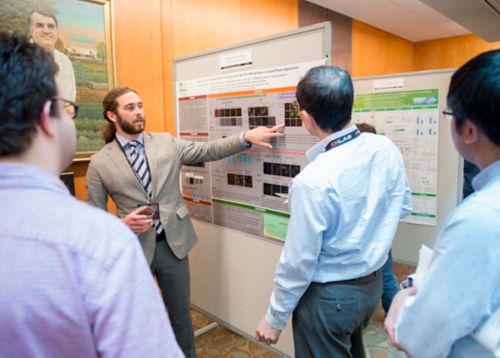St. Jude Family of Websites
Explore our cutting edge research, world-class patient care, career opportunities and more.
St. Jude Children's Research Hospital Home

- Fundraising
St. Jude Family of Websites
Explore our cutting edge research, world-class patient care, career opportunities and more.
St. Jude Children's Research Hospital Home

- Fundraising
St. Jude hosts National Graduate Student Symposium

University of Colorado Boulder graduate student David Protter discusses his research during the National Graduate Student Symposium poster session.
A current postdoc and alum of the St. Jude National Graduate Student Symposium finds that research culture begins with supporting new researchers.
I recently hosted a group of students visiting St. Jude Children’s Research Hospital as participants in the National Graduate Student Symposium.
This small, selective, focused symposium, hosted for more than 15 years at St. Jude, affords these new scientists an opportunity to network and learn more about research here. Fewer than 25% of applicants are accepted.
This year, students from 32 PhD-granting institutions were represented, including my alma mater, Tulane University School of Medicine. I was also able to host an MD-PhD student from Tulane in my small group.
Many presentations focused on current hot areas of research such as CRISPR/Cas9. Others represented the full spectrum of work at St. Jude, including epidemiology, structural biology, biochemistry and cancer biology. Several participants were impressed not only with the research being presented, but also the St. Jude community participation in them.
The NGSS reminded me of my first visit to St. Jude two years ago during the Future Fellows Conference. The willingness of faculty and postdocs to attend and support events like this illustrates the collaborative culture of St. Jude: people are genuinely interested and curious about what work is being done, not just the work in their own labs.
My group of students were driven and clearly dedicated to research. As new, aspiring researchers, it’s important to be a part of an institution that supports you.
Many of the things about St. Jude that impressed me during my initial visits as a Tulane grad student also impressed the grad student I was hosting. From the scope of resources and core facilities to the financial investment made in individual scientists, postdocs are treated as part of the St. Jude mission, not just members of individual labs. There are also career development opportunities and a dedicated postdoc support staff.
It’s this combination of world-class resources and outstanding institutional support that convinces many participants in both the NGSS and FFC to ultimately choose St. Jude for their postdoctoral fellowships. In fact, we recently had 10 return after completing their PhD I look forward to seeing some of these graduate students again soon to welcome them to St. Jude.
If you’re interested in postdoc opportunities at St. Jude, take a look at our research careers.






